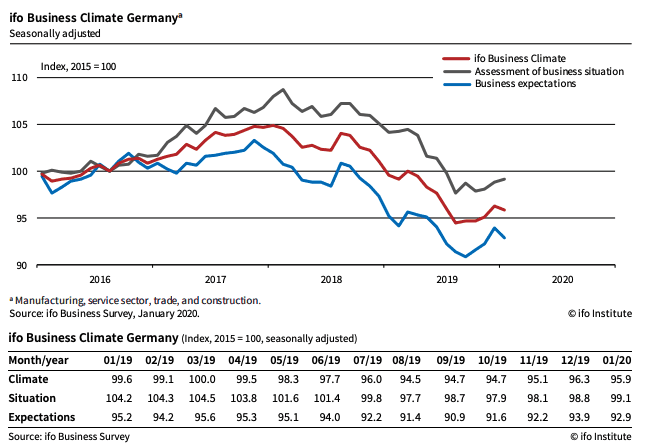"Bafflingly Weak": Key German Sentiment Data Disappoints

Image © Thorsten Schier, Adobe Images
Hopes for a resurgence in German economic activity in the early stages of 2020 took a knock after a much-watched survey on the Germany economy disappointed.
The German ifo Business Climate Index read at 95.9 in January, which is a disappointment against expectations for a reading of 97.0 to be delivered. Indeed, it suggests that sentiment slumped between December and January as the previous month's reading was higher at 96.3.
Markets are anticipating an improvment in German economic performance in 2020 following the striking of a Phase 1 trade deal between China and the U.S., putting to bed months of anxiety over the outlook for global trade. "A cold shower for all optimists. Germany’s most prominent leading indicator, the Ifo index, just started the new year with a disappointment, dropping for the first time since August last year," says Carsten Brzeski, Chief Economist at ING in Germany.
The Current Assessment component of the survey read at 99.1, slightly worse than the 99.2 expected by markets but is nevertheless the strongest improvement in this compenent since February 2017. The Business Expectations component read at 92.9, which is down on the previous month's 93.9 and worse than the 95.0 expected by markets.
"Sentiment among German managers is somewhat diminished," said Clemens Fuest, President of the ifo Institute, when releasing their findings. "This was due to companies’ more pessimistic outlook for the coming months. In contrast, the indicator of the current situation rose slightly. The German economy is starting the year in a cautious mood."
However, one bright spot for the economy was found in the manufacturing sector, which the ifo says "is showing signs of recovery".
Nevertheless, Claus Vistesen, Chief Eurozone Economist at Pantheon Macroeconomics described the data as "bafflingly weak," particularly as other surveys of the economy are telling a different story
"This is a big disappointment in light of the otherwise solid PMI data," says Vistesen. "The IFO is now telling the complete opposite story than the PMIs, and ZEW investor sentiment data, where expectations are now improving rapidly."
Looking at the details, Vistesen says the details of the Ifo report are odd, as manufacturing sentiment improved significantly, but it fell in services. This is "in stark contrast to the jump in the services PMI," says Vistesen.
In the service sector, the indicator fell noticeably. "This was due to companies’ considerably more restrained expectations. However, they were somewhat more satisfied with their current situation," says Fuest.
In trade, the business climate improved. The indicators of the current situation and of expectations were both higher than in the previous month. However, this was due solely to wholesalers; retailers were more reserved.
In construction, the index fell back. Companies’ assessments of the current situation dropped to their lowest level since June 2018. "In addition, they were even more skeptical about the coming months," says Fuest.
"Today’s Ifo index is a painful warning against premature optimism. The German economy is in a phase of bottoming out, which could come just in time to avoid more negative spillover effects from the manufacturing weakness to the labour market. However, for the time being, the economy remains stuck at the bottom," says ING's Brzeski.




